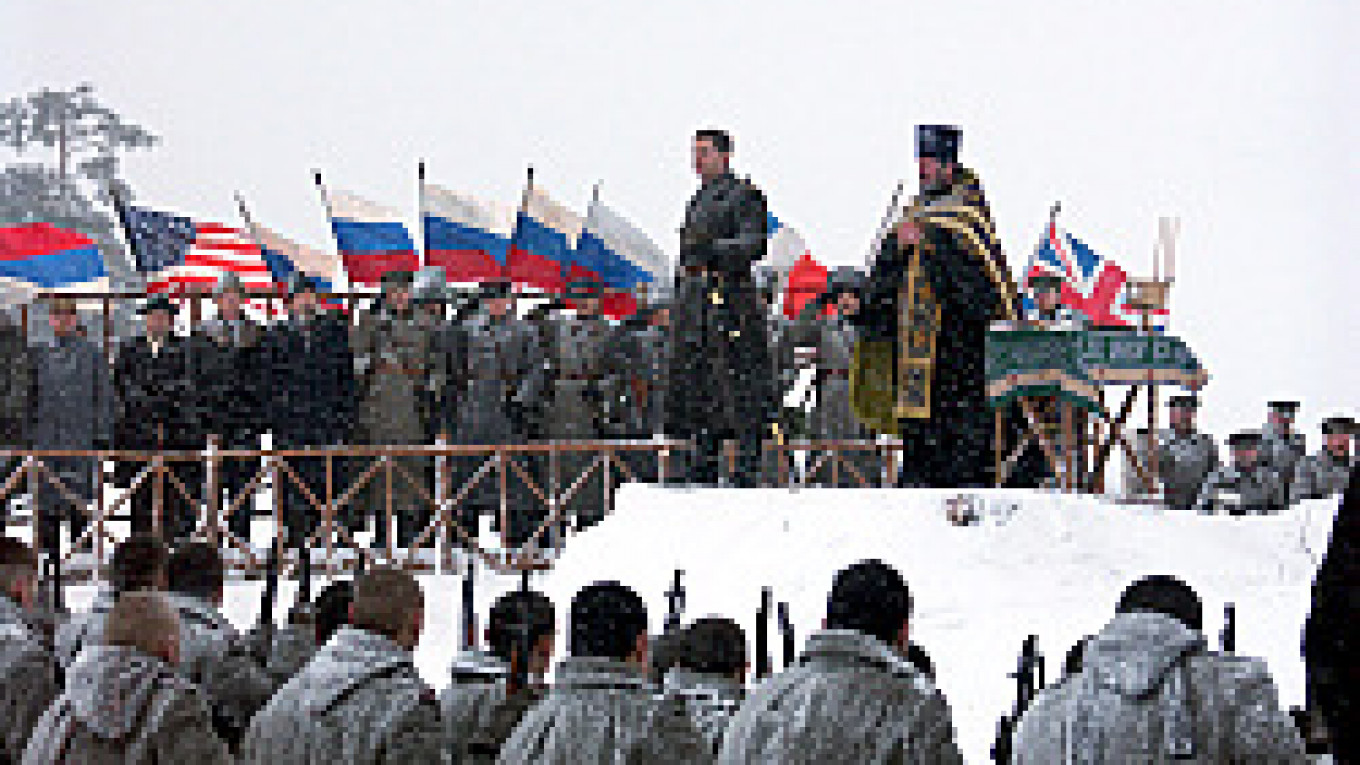Its pedigree certainly bodes well, coming as it does from the Channel One film production outfit that brought viewers Timur Bekmambetov's "Night Watch," as well as his more recent "Irony of Fate: Continuation." Star Konstantin Khabensky (Kolchak) topped the bills in all three movies, and he's rejoined in "Admiral" by fellow "Irony" actors Yelizaveta Boyarskaya, as Kolchak's final love Anna Timireva, and Sergei Bezrukov, as General Kappel, his friend in military service but rival in love.
For Kravchuk, however, it's a distinct departure from his previous film, "The Italian," a small and intimate drama set in a contemporary Russian orphanage. "Admiral" took almost five years to make, and the director is helped by some spectacular special effects in battle scenes, as well as by quality ensemble acting and a strong script, although there's a lot of action condensed into the epic tale.
From an opening Baltic Sea conflict with the Germans in 1916, the film stretches through the time of Alexander Kerensky's provisional government and Kolchak's command of the Black Sea Fleet. After the Revolution, he leaves Russia only to return to take command of forces resisting the Bolsheviks and lead a provisional government in Omsk. When their fortunes founder, the Whites retreat to Irkutsk, where they are eventually doomed by changes in local and international allegiances.
Action alternates between big military scenes and the much more intimate world of Russian officers off duty, where Kolchak meets and falls in love with Anna, breaking up his own marriage and family, as well as that of his comrade Kappel.
Technically, the film is an outstanding achievement for cinematographers Igor Grinyakin and Alexei Rodionov, who combine sharper focus (often with little light, creating a sense of war's darkness) in the major scenes, with a softer focus, particularly notable in scenes with Anna.
In short, "Admiral" should go big, certainly at home and probably internationally too. Which certainly can't be said for Guka Omarova's "Baksy," which is only managing a three-print release in Moscow, including some time slots that look distinctly inhuman for most filmgoers.
If you can't face staying up into the early hours, then catch it on DVD release, because it's a small film that speaks strongly about social mores and ethnic traditions in Kazakhstan, whose distinctive landscapes is captured with considerable accomplishment.
It's not didactic. Omarova brought a similar grasp of contemporary reality to her last film "Schizo" and its young central character. In "Baksy," her heroine is at the other end of the age range completely: The title is the Kazakh word for shaman, played here in the role of Aidai by the impressive actress Neisipkul Omarbekova.
An earlier potential English title was "Native Dancer," which gives more of a sense of the film's local color. Aidai practices her traditional gifts -- mainly curing those who come to her with a variety of ailments and complaints -- from a remote roadside location on the steppe. However, her age-old practices are threatened by the modern world in the form of New Kazakhs determined to build a petrol station on the site. Caught in between is Batir (Farkhad Amankulov), a businessman whose loyalties are to the shaman but who is being threatened by criminals after his land.
A kidnapping, an unexpected explosion and an unexpected rebirth bring narrative to the film, though its prime interest is in its depiction of a way of life that continues to this day. Made with the strong contribution of co-scriptwriter (Omarova) and producer Sergei Bodrov, who himself has long experience in the region, the film isn't an exercise in anthropology -- it is a drama, with considerable doses of humor along the way.
Unlike "Admiral," special effects don't feature -- but the landscape speaks strongly for itself, as does its acting. And unlike Kravchuk's film, "Baksy" will likely score more acclaim abroad than in Russia. Bigger is not always better.
Admiral 3,5/5
Baksy 3,5/5
A Message from The Moscow Times:
Dear readers,
We are facing unprecedented challenges. Russia's Prosecutor General's Office has designated The Moscow Times as an "undesirable" organization, criminalizing our work and putting our staff at risk of prosecution. This follows our earlier unjust labeling as a "foreign agent."
These actions are direct attempts to silence independent journalism in Russia. The authorities claim our work "discredits the decisions of the Russian leadership." We see things differently: we strive to provide accurate, unbiased reporting on Russia.
We, the journalists of The Moscow Times, refuse to be silenced. But to continue our work, we need your help.
Your support, no matter how small, makes a world of difference. If you can, please support us monthly starting from just $2. It's quick to set up, and every contribution makes a significant impact.
By supporting The Moscow Times, you're defending open, independent journalism in the face of repression. Thank you for standing with us.
Remind me later.


